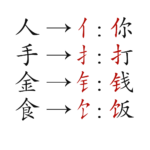Articles in the ‘Intermediate’ category Page 8
-
Why flashcards are terrible for learning Chinese
Flashcards are often viewed as a silver bullet, promising swift mastery of characters, words and more, but relying on flashcards too much has serious drawbacks, and if you’re not careful, they can hinder more than they help.
Read → -
Student Q&A, December 2023: How many words to learn, if it’s good to learn radicals, and whether to learn simplified or traditional characters
How many words is reasonable to learn in a day? Will focusing on radicals make learning characters easier? And should you learn simplified or traditional characters, or maybe both?
Read → -
Why flashcards are great for learning Chinese
The humble flashcard: A key component in a successful strategy, or a distraction from what truly matters? Few things have sparked as much debate as the use of flashcards for learning a foreign language.
Read → -
Is learning things by heart good for improving your Chinese?
Learning things by heart used to be a mainstay of language education but is now often frowned upon. Is learning things by heart good for improving your Chinese or just a waste of time
Read → -
Student Q&A, November 2023: Reading Pinyin or characters, comprehensible vs. compelling content and reading tools
How do you transition from reading Pinyin to reading characters? Are compelling texts better than comprehensible texts? And which tools should you use when reading Chinese?
Read → -
Shapeshifting Chinese characters
Most Chinese character components are well-behaved; they look the same in different compounds and aren’t hard to recognise. Some components are sneaky, though; they change appearance depending on context! Let’s have a closer look at these shapeshifting characters.
Read → -
You won’t learn Chinese simply by living abroad
A widespread myth about learning Chinese is that you will master the language simply by moving abroad to live in an immersion environment. However, how much you learn is determined by how much you engage with the language, not by your geographical location.
Read → -
100 hours of Chinese listening in 3 weeks: What I learnt and how to apply it
The more you listen, the more you learn. That’s why I listened to one hundred hours of Chinese in just three weeks. Here’s what I learnt and how you can apply that to your own learning.
Read → -
Listen more than once: How the replay button can help you learn more Chinese
Listening more than once is a simple yet overlooked trick for improving your listening ability in Chinese. By replaying audio, you give your brain more time to process the language, and as a result, you will understand and learn more.
Read → -
The cheapest and most convenient way to improve your spoken Chinese
The cheapest and most convenient way to improve your speaking ability in Chinese is… to talk to yourself! Beyond being both easy and free, it’s more helpful than you might think.
Read →









